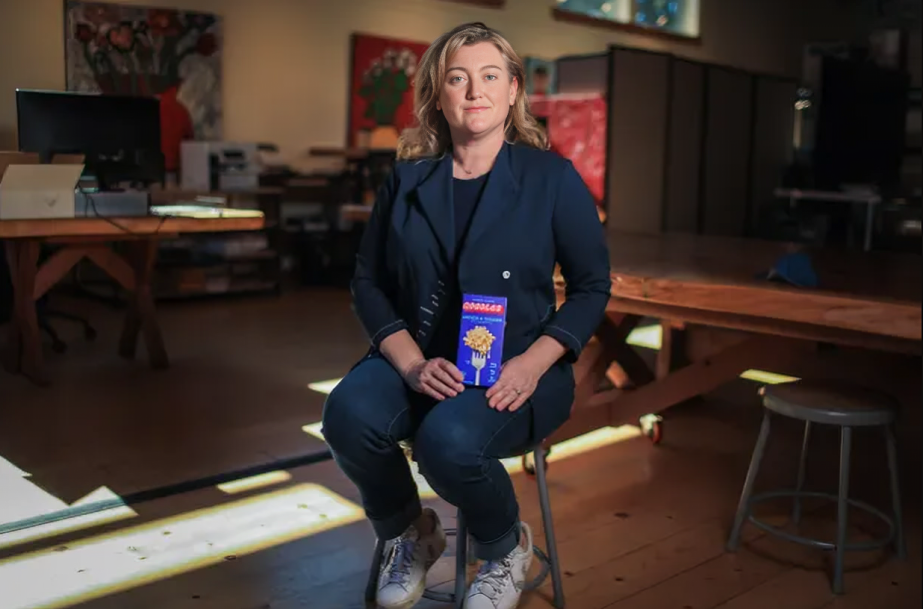Jen Zeszut’s roots may be in consumer packaged goods (CPG) software, but these days she lives and breathes the making side of things.
Jen and her co-founders entered the industry with a bang, disrupting the great mac and cheese duopoly with Goodles. Because even though mac and cheese is beloved by kids and adults alike, there were only two major players in the market at the time.
And what a disruptor Goodles has been. With its “stealthily healthy” mentality, Goodles packs 15 grams of protein in a cup of mac and cheese, plus fiber. Its variety of unique flavors have made it a hit with kids, athletes, health-minded celebrities and the masses alike.
Goodles has been a smash success story in the CPG space — but Jen didn’t go into it lightly. “You don't do it on a whim,” she explains. “You've got to make sure that every single star is aligned. So in order to hit it really big, and to have a really big success, everything has to be there.”
On an episode of the How I Raised It podcast, Jen talks about how to enter an intrinsically risky category, shopping for the right partnerships and bringing celebrity investors and influencers to the cap table for the ultimate win-win situation.
De-risking CPG investments
CPG is a unique beast for fundraising. Even though Jen came up in CPG software and had access to a network of software investors, those are not the same people who typically invest in CPG. She was basically starting from scratch.
To ensure they weren’t a flash in the pan, Jen knew Goodles needed a sizable seed round investment and a strong product. She tapped thousands of consumers across the US to be taste testers. That would mean thousands of pounds of pasta that were produced and often scrapped because they didn’t meet their rigorous quality and taste standards. So Jen did what so many entrepreneurs do — she emptied her 401K and went all-in on testing Goodles.
Her 401K was not cleaned out in vain. Of the 3,000 taste testers across the country, Goodles had a 92% switch rate from the two most popular mac and cheese producers.
By having such a strong success story, Jen was able to raise a whopping $27 million for Goodles’ seed round. This is what Jen calls “de-risking.” CPG is known to be a more volatile investment category that doesn’t always see the returns of something like software. Since she demonstrated traction on a very solid product, she was able to make a convincing case to investors.
Picking your partners wisely
Just because CPG is a difficult space for fundraising doesn’t mean you have to take every check that comes your way. Jen found value in knowing when to walk away from the wrong kind of money.
“You think it's about securing money,” she says. “That's not what it's about. The money is one thing you're going to need to help you be successful, but it is not everything. You're looking for a partner who's going to give you the best odds of success. Usually money is the easiest thing to come by. You're looking for a partner.”
So with her de-risked investment opportunity, she asked around for introductions to CPG investors. Like most startups, Goodles got a ton of nos, and even some of the yeses weren’t winners. On the day the money was to be wired from one investor, things got fishy fast. Emails were bouncing to their internal contacts, and there was some indication on a phone call that the money might not have been legally acquired.
Jen’s advice? “If there's anything weird, you run the other way.”
For Goodles’ Series A, Jen and her team found themselves in the power seat. Venture capitalists came to their headquarters, met with all of the company’s departments and discussed the direction of the company. Jen’s team then scored each potential investor for fit based on the questions they asked and their knowledge of the field. Even if you don’t have multiple investors coming to court you, it’s smart to look at any checks you’re offered through the lens of whether that investor would be a partner or just along for the ride.
Playing the fame game
Once Goodles appeared in national chains like Target and Whole Foods, word spread quickly. Athletes, celebrities and influencers began to approach Jen for investment opportunities.
These investors have been some of the greatest assets for Goodles. Because they believe in and use the product, they’re willing to talk about it organically to their large crowds of followers. They serve Goodles at their baby showers, show pictures of their pantries with Goodles in it and talk up the brand in their day-to-day content.
By being open to having celebrity and influencers investors, Goodles has brought on the likes of Gal Gadot and Klay Thompson, plus plenty of other athletes, like NFL players, World Cup Soccer players and MLB athletes. And they, in turn, promote the good of Goodles.
Parting words
Jen cautions founders against getting too greedy with holding onto shares.
She calls valuation and liquidation preference “red herrings,” throwing founders off the scent of what’s really important: having partnerships where everyone gets something out of it.
Investors need enough ownership to really care, and in turn, that works out for the benefit of all involved — even the not-famous investors.
Article is based on an interview between Nathan Beckord and Jen Zeszut on an episode of Foundersuite's How I Raised It podcast.


